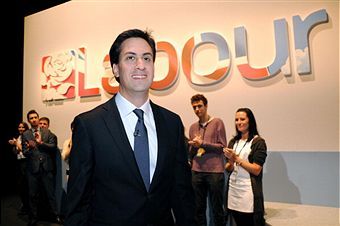 Ed Miliband has been across the airwaves this morning, explaining that the values
outlined in his speech yesterday will inform Labour’s policy direction over the next four years – a statement that calls to mind a crude saying regarding Sherlock Holmes. He is doing
this because most commentators agree that his speech was incoherent. Here is a selection of the reaction in this morning:
Ed Miliband has been across the airwaves this morning, explaining that the values
outlined in his speech yesterday will inform Labour’s policy direction over the next four years – a statement that calls to mind a crude saying regarding Sherlock Holmes. He is doing
this because most commentators agree that his speech was incoherent. Here is a selection of the reaction in this morning:
The Times’ leading column (£):
‘Generally he did better with his attacks than with phrases that sought to describe his vision. His larger problem — that people have difficulty seeing him as prime minister — is unlikely to have been affected much by this performance.’
Matthew Norman in the Independent:
‘Three minutes and 45 seconds into Ed Miliband’s speech yesterday, my mind wandered off to a fantasy world in which some mischievous sprite had spiked his larynx-lubricating Evian with a truth serum. “Conference,” intoned Little Ed in the escapist grotto of my mind, “you’ll have read that this is the most important speech of my life. Cobblers. It couldn’t matter less. Outside this hall and a few newsrooms, think-tanks and blogger’s bedrooms, not a soul is listening to a word I say.’
Daniel Finkelstein in the Times (£):
‘I feel almost embarrassed to offer my own contribution, because it is ridiculously unsophisticated and is also pretty much immune to alteration by any of the things that are happening here. It consists of two points. First, most people don’t think Ed Miliband is up to being prime minister. And second, he is too left-wing. And there’s not a lot Labour can do about either of those things. That’s the signal, the rest is just noise.’
Polly Toynbee in the Guardian:
‘Do these monstrous annual endurance tests make and break leaders? IDS’s “quiet man” croak destroyed him but Kinnock’s brave tirade against Liverpool’s militants didn’t save him. This speech will gain in reputation as a turning point with all the prime ingredients for a long run-in to the next election. Four years is an eternity for fleshing it out. All new opposition leaders drop in ratings at first: both pollster Deborah Mattinson and YouGov’s Peter Kellner say the crunch test is whether they rise in their second year. Labour is least loathed of the parties – 70% willing to consider voting for them, only 58% able to tolerate the thought of ever voting Tory. His fate may rest with growth and employment figures far beyond his control, but Miliband set out ideas that may well resonate because they well reflect what so many people feel has gone badly wrong.’
Benedict Brogan in the Telegraph:
‘Leaders’ speeches can too often be a self-aggrandising checklist rather than a thought-out argument with answers attached. Mr Miliband gets marks for setting out a challenging critique of Britain as he sees it – but his solutions should fill all of us with dread. He would have government choose between predators and producers by ending the state’s statutory neutrality. How, he doesn’t say, but he invites us to imagine some kind of Treasury Corporate Morality Directorate taking past Labour mistakes a step further by picking winners and losers. Company boards would have to appoint workers’ representatives, every school would receive a quota of places at the best universities, and companies would be protected from foreign competition. The last got a cheer from the hall to make a free-trader shiver.’






Comments